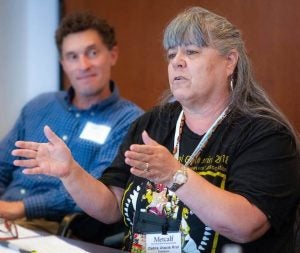 “My people have always had a relationship with the land,” says Debra Krol, a member of the Jolon Salinan Tribe in California. “Our stories say that we were put here on the Earth not to be the lords and masters, but to be the janitors and stewards of the land.”
“My people have always had a relationship with the land,” says Debra Krol, a member of the Jolon Salinan Tribe in California. “Our stories say that we were put here on the Earth not to be the lords and masters, but to be the janitors and stewards of the land.”
Environmental journalism isn’t just a calling for Krol, it’s a part of her ancestral roots. “I want to provide the Indigenous perspective, the Indigenous voice that is missing from so much environmental coverage.”
Krol, an alumna of Metcalf Institute’s 2019 Annual Science Immersion Workshop for Journalists, originally pursued a career in electronics, but searched for a deeper passion in life. “Let’s just say I was really, really bored,” she says. An avid writer since the age of six with an interest in science and technology, she knew what she had to do: quit her job and head back to school to become a science writer.
While studying biology at Arizona State University, Krol always found ways to link her studies to her cultural identity. “I’m really interested in the connection and the commonalities between how Western science is practiced and how my ancestors and elders practice science,” says Krol. “We Indigenous communities have our own way of approaching science.” She noted, for example, how western science tends to focus on classifying and quantifying, while Indigenous science has a more cyclical and synergistic approach.
Krol has held a variety of positions over the years including editor of a tribal newspaper and publications editor at the Heard Museum, a museum dedicated to the advancement of Indian Art. She spent 20 years as a part-time freelance journalist for numerous news outlets including High Country News, VICE News, the Huffington Post, and Winds of Change, a magazine published by the American Indian Science and Engineering Society.
She launched her fulltime-freelance career in 2018, the same year she applied for Metcalf’s Annual Workshop. “The information I gained from the workshop in just one week really helped me understand and explain climate change much better,” says Krol.
Krol’s reporting has earned her numerous awards over the course of her career, such as the Native American Journalists Association’s award for Best Beat Reporting on environmental issues, and most recently, a Pulliam Fellowship with the environmental team of the Arizona Republic.
Krol proudly brings an Indigenous perspective to her reporting, sharing unique insights on Native culture including the value of traditional ecological knowledge, knowledge of the environment acquired by Indigenous cultures over thousands of years. “When I talk to some elders, they say you can’t look back 100 years, you need to look back the last 5000 years,” Krol notes.
Krol’s stories are often at the intersection of environmental issues and challenges faced by Indigenous communities across the nation. In one story, she highlights the struggle non-federally recognized tribes have in tackling environmental issues and protecting cultural sites because they lack access to federal funds. Another story written by Krol, which explores how Native issues are covered in the media, highlights the need for journalists to research proper protocol before reporting on Indigenous communities. According to Krol, some tribal leaders are reluctant to engage with reporters because of past inaccuracies and misinformation.
“I’m also hopeful that by conducting deep research, being willing to leave assumptions at the door, and understanding cultural boundaries, reporters outside the Indigenous community can grow their knowledge and skill sets to report on Indigenous communities so that tribes like mine don’t feel the need to go underground again,” she wrote.
Krol now has her sites set on environmental challenges impacting Indigenous people in other parts of the world including the Arctic Circle and Oceania. It’s her hope that giving voice to those most vulnerable to global change will help bring disparate groups together to solve environmental problems.
“I really like to write about those types of issues because it shows how people are coming together to address climate change and trying to figure out how to keep as many species intact as possible,” says Krol. “Let’s show how my people and Western scientists can work together to make informed decisions for the future of our planet.”
Read More Alumni Profiles
